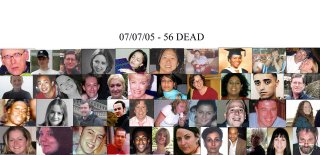
A US report has uncovered a terror plot to bomb the Holland Tunnel in Lower Manhattan, New York [Daily News]. This news released on the same day that Britain commemorates its first anniversary of a terror attack that left 52 dead. On the 7th of July 2005 four suicide bombers detonated their explosives on London’s transport network, three underground trains and a London bus. But the legacy is that Britain’s preparedness for another attack has moved forward very little. A report from the London Assembly has already highlighted a catalogue of failures on the day. Communications failure, lack of command structure and shortage of medical supplies being just some of the many problems faced by London’s emergency services. Calls for a public enquiry have also been resisted strongly by the UK government, Tony Blair insisting there would be “little more to learn” from such an enquiry. A similar enquiry into the 9/11 terror attacks in the USA was also fiercely resisted by George W. Bush, but after much pressure from the media, senators and families of the victims he conceded. The result – a 567 page bestseller which outlined a number of failures and put forward many recommendations. It seems unlikely that the UK will follow suit in providing the public with such a document. The UK has a very different way of recording events. After the US terror attacks many publishers and news organisations released books in commemoration of the events. The New York Times published “A Nation Challenged”, a large hardback book showing in depth coverage, analysis and photographs. Even the NYPD [New York Police Dept] published a book, “Above Hallowed Ground”, a document of the police’s roll that day. One book reproduced more than 1000 photographs taken by professionals and members of the public. The images reflect many different emotions of the day, hope, despair, love, strength and resilience. “Here Is New York” also raised money for the victims of 9/11.
In the UK there were no commemorative books covering the events of the 7/7 attacks. Britain’s reaction is far more muted. But there are shows of defiance as seen in Alfie Dennen’s website We’re Not Afraid, set up as a response to the bombings and inspired partly by the reaction of the Spanish who marched in defiance of the terrorist following the Madrid bombings of 11th March 2004.
However many Londoners would prefer to forget or move on. Tragic though the events of 7/7 were, many express a fateful view, “When your time is up, your time is up”, one commuter told CNN’s Christiane Amanpour. Indeed many more people die on Britain’s roads, or from cancer, AIDS and countless industrial accidents. But terrorism is preventable, to a degree. Intelligence failures have highlighted the problem Britain faces in attempting to protect the country from further attacks. Some of the bombers had already shown up on intelligence files but little action was taken. Even US intelligence warned MI5 about their concerns of Mohammad Sidique Kahn but no action was taken [The Times]. Although MI5 has always denied knowing that Mohammad Sidique Khan was a potential danger, the CIA is alleged to have discovered in 2003 that he was planning attacks on American cities. The disclosures are made in a book by the award-winning author Ron Suskind that is serialised today in The Times. The claims contradict evidence from Dame Eliza Manningham-Buller, the Director-General of MI5, to the parliamentary Intelligence and Security Committee that Khan had never been listed as a terror threat before the attack
There have been successes however. The Metropolitan Police have, they say, thwarted many terror cells and possible terror attacks. Some trials are indeed ongoing.
But as Britain marked the day with two minutes silence, there were many mixed emotions for the families of the 52 dead and the 770 injured, many of whom have received little, if any, compensation.

No comments:
Post a Comment